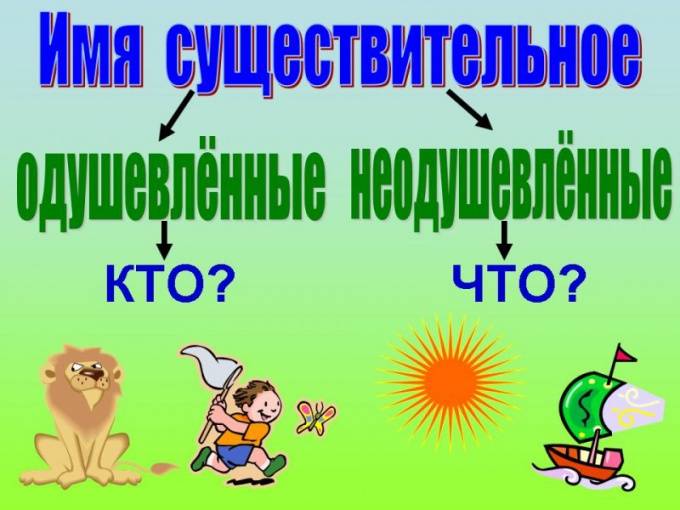Instruction
1
Nouns in the Russian language can be divided into two categories: mutable and immutable. Immutable to include words such as "coat", "kiwi", "kohlrabi", etc. These words are not many, they came in Russian language from other languages.
2
Most nouns in the Russian language changes. Namely leaning. This means that nouns change according to case and number.
3
In the Russian language there are six cases: Nominative, Genitive, Dative, Accusative, Instrumental and Prepositional. Each case correspond to the subsidiary questions:
- I. p. – "who?" "what?";
- R. p. – "who?", "what?";
- D. p. – "who?", "what?";
V. p. - "who?", "what?";
- T. p. – "who?", "what?";
- P. p. – "who?", "what?".
Change case, nouns have certain endings. And depending on what endings nouns belong to the I, II or III decline.
- I. p. – "who?" "what?";
- R. p. – "who?", "what?";
- D. p. – "who?", "what?";
V. p. - "who?", "what?";
- T. p. – "who?", "what?";
- P. p. – "who?", "what?".
Change case, nouns have certain endings. And depending on what endings nouns belong to the I, II or III decline.
4
The word "work" like other nouns feminine and masculine ending in "a/I" refers to the first declension. Change it as follows: in the singular: I. p. – "work", R. p. – "work", D. p. – "work", V. p. – "work", Etc. – the "work", p. P. – "on the go"; plural: "work", "work", "work", "work", "works", "works" respectively.
5
The words masculine and neuter belong to the second declension. For example, the masculine "forest". Its case forms in the singular: "forest – forest – forest – forest – forest – forest"; PL.CH.: "forests – forests – forests – forests – forests – forests".
6
Third declension words are feminine with a soft sign on the end. For example, the word "youth" ("youth – youth – youth – youth – youth – youth").
7
In the Russian language there are two numbers: singular and plural. Most nouns form singular, and plural. So, changing according to case and number, these words will have 12 forms.
8
But there are nounsused only in singular or only in plural. For example, words such as "foliage", "milk", "youth" is always singular. And the words "scissors", "pants", "Wallpaper" is only plural. Accordingly, inclination, these words will have not 12 but only 6 of case forms. For example, "milk – milk – milk – milk – milk – milk" or "Wallpaper – Wallpaper – Wallpaper – Wallpaper – Wallpaper – Wallpaper".
9
It is sometimes difficult to determine the choice of particular case forms. How to say "locksmiths" or "locksmith", "I want tea" or "want tea"? In this case, come to the aid of a spelling dictionary, in which, in addition to the initial forms of words are specified and some of the case endings. As well as the options of the use of words.
10
It is sometimes said that nouns change according to the gender. This is a gross error. Nouns genders do not change, but have the category of gender. The word "spring" is feminine, "Les" is masculine, "the" middle. Those words, which have the form only plural, with the category of gender are not associated.
